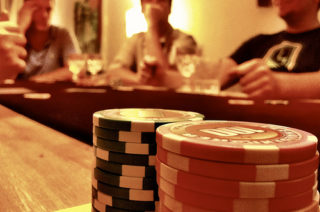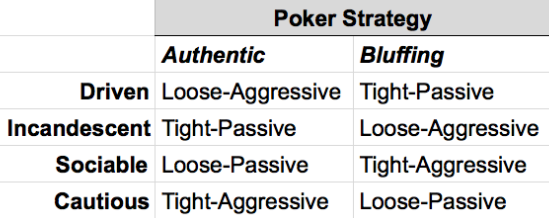
You can’t win if Gus Hansen already did.Photo by: ND Strupler
Why would this work? Because Ci can easily be transcribed as “perfect planning” – and a good plan today beats a perfect plan tomorrow.
That’s the Madelyn Nguyen theory of egoism, and I like it so much that I wrote a song about it (with baritone backing vocals in parentheses):
You can’t win if Madelyn Nguyen already did.
(You can’t win. If she just did.)
You can’t win if Madelyn Nguyen already did.
(You can’t win. She just did.)
She’s a super-hero but when you look at her
all you see is a kid.
(You think. She’s just a kid.)
Here’s the deal: DISC-my-way is the game theory of everything, and, accordingly, it’s also really good for winning games.
Vide:
That’s the DISC of Poker, but it’s also the DISC of any game – from board games to salesmanship to romance. If values can be won or lost by skill or guile, this is how the spoils get spilled.
Understanding people is of less value in rigid, transparent games like Chess or Go – and this is why they are so beloved of Cautious temperaments.
Understanding people matters everything in Poker, and that’s why high-C’s try to play the game as rigidly as they can – the Sklansky strategy, tight-aggressive.
That’s their leak, though, as Gus Hansen lives to demonstrate. C is cautious, D is bold. C is deliberate and risk-verse. D is reckless. Hansen consistently kicks the asses of some of the best Ci players in professional Poker by being a Di with an Id affected table image. Who can get a read on a wild man? Who can even put him on cards?
And this may be the best long-term strategy for winning at board or card games. Don’t grind up against Ci’s, ever, not without huge pot-odds: They never tire of shaling away. But play as a Di and bluff as an Id – and see if you can’t run the table, Madelyn Nguyen style, before anyone else knows what hit ’em.
That chart enables you to try out other people’s DISC profiles, when you are playing a game, to see how they play out. That much is of huge benefit, just by itself.
Here’s an even better idea: Bump the D when you play, to see if you might win more and faster. And bump the S at home – because the only values worth hanging onto are Sociable values.
















